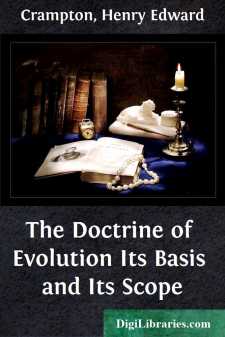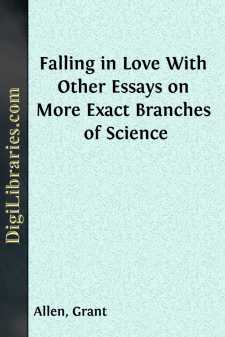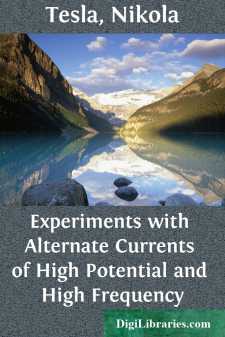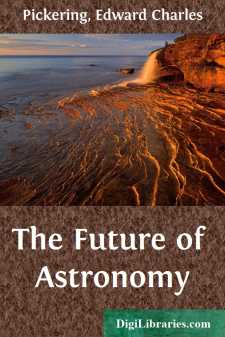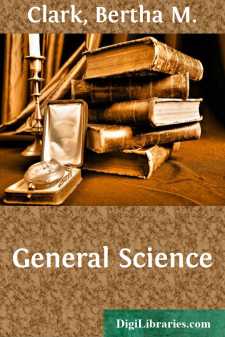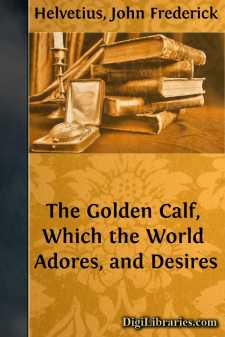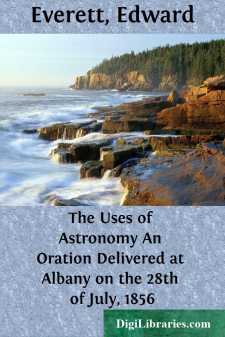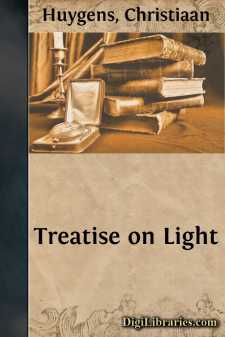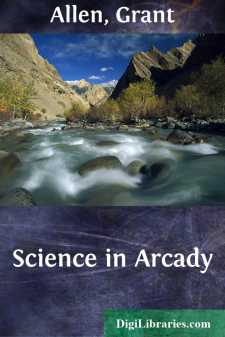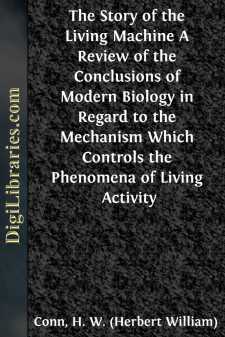Science
- Astronomy 18
- Biology 40
- Chemistry 13
- Electricity 1
- General 38
- History 6
- Light 1
- Paleontology 2
- Philosophy & Social Aspects 1
- Physics 3
- Relativity 2
- Study & Teaching 1
- Waves & Wave Mechanics 1
Science Books
Sort by:
I EVOLUTION. THE LIVING ORGANISM AND ITS NATURAL HISTORY The Doctrine of Evolution is a body of principles and facts concerning the present condition and past history of the living and lifeless things that make up the universe. It teaches that natural processes have gone on in the earlier ages of the world as they do to-day, and that natural forces have ordered the production of all things about which...
more...
by:
Grant Allen
FALLING IN LOVE An ancient and famous human institution is in pressing danger. Sir George Campbell has set his face against the time-honoured practice of Falling in Love. Parents innumerable, it is true, have set their faces against it already from immemorial antiquity; but then they only attacked the particular instance, without venturing to impugn the institution itself on general principles. An old...
more...
by:
Nikola Tesla
Biographical Sketch of Nikola Tesla. While a large portion of the European family has been surging westward during the last three or four hundred years, settling the vast continents of America, another, but smaller, portion has been doing frontier work in the Old World, protecting the rear by beating back the "unspeakable Turk" and reclaiming gradually the fair lands that endure the curse of...
more...
THE FUTURE OF ASTRONOMY BY PROFESSOR EDWARD C. PICKERING HARVARD COLLEGE OBSERVATORY It is claimed by astronomers that their science is not only the oldest, but that it is the most highly developed of the sciences. Indeed it should be so, since no other science has ever received such support from royalty, from the state and from the private individual. However this may be, there is no doubt that in...
more...
by:
Bertha M. Clark
CHAPTER I HEAT I. Value of Fire. Every day, uncontrolled fire wipes out human lives and destroys vast amounts of property; every day, fire, controlled and regulated in stove and furnace, cooks our food and warms our houses. Fire melts ore and allows of the forging of iron, as in the blacksmith's shop, and of the fashioning of innumerable objects serviceable to man. Heated boilers change water into...
more...
CHAP. I. Most Excellent, and Prudent Sirs. Before I enter upon the Description of the Philosophick PIGMY,(in this little Theatre of Secrets) overcoming and subduing GIANTS, I pray permit me here to use the words of Vanhelmont, taken out of his Book De Arbore Vitæ, fol. 630. and here Transcribed. I compelled to believe, that there is an Aurifick, and Argentick Stone. But (Friend of the Spagyrick Art) I...
more...
by:
Edward Everett
TWO NEW INSTITUTIONS OF SCIENCE; THE SCENES WHICH ATTENDED THEIR CHRISTENING. In the month of August last, two events took place in the city of Albany, which have more than an ephemeral interest. They occurred in close connection with the proceedings of a Scientific Convention, and the memory of them deserves to be cherished as a recollection of the easy way in which Science may be popularized and be...
more...
CHAPTER I ON RAYS PROPAGATED IN STRAIGHT LINES s happens in all the sciences in which Geometry is applied to matter, the demonstrations concerning Optics are founded on truths drawn from experience. Such are that the rays of light are propagated in straight lines; that the angles of reflexion and of incidence are equal; and that in refraction the ray is bent according to the law of sines, now so well...
more...
by:
Grant Allen
About the middle of the Miocene period, as well as I can now remember (for I made no note of the precise date at the moment), my islands first appeared above the stormy sheet of the North-West Atlantic as a little rising group of mountain tops, capping a broad boss of submarine volcanoes. My attention was originally called to the new archipelago by a brother investigator of my own aerial race, who...
more...
CHAPTER I. IS THE BODY A MACHINE? The problem before us in this section is to find out to what extent animals and plants are machines. We wish to determine whether the laws and forces which regulate their activities are the same as the laws and forces with which we experiment in the chemical and physical laboratory, and whether the principles of mechanics and the doctrine of the conservation of energy...
more...


